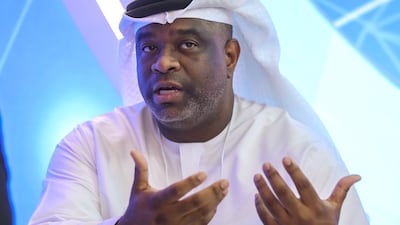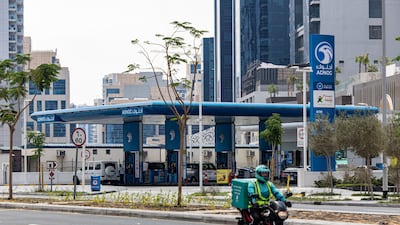Adnoc Distribution, the UAE’s largest fuel and convenience retailer, will accelerate the roll-out of electric vehicle charging points across its locations next year and expects to operate 50 of them by the end of 2023, according to its chief executive.
The company, which has more than 500 services stations in the UAE, will focus on installing the charging points on highways where demand is higher, Bader Al Lamki told The National in an interview.
“People commute from Al Ain to Abu Dhabi, Abu Dhabi to Dubai and Abu Dhabi to the Al Dhafra region [and] the need for recharging the car could arise,” Mr Al Lamki said.
“We're taking serious steps towards enabling the roll-out of EV chargers to attend to the needs of increasing demand for EV cars. Towards the end of this year, we are likely to have 50 charging points across the network.”
He added: “We stand ready, and we have the coverage on the highways and … we definitely see ourselves as a key enabler for EV mobility in the coming years.”
Adnoc Distribution, which currently operates 38 EV charging points, teamed up with Abu Dhabi National Energy Company, better known as Taqa, in January to create a joint venture that will build and operate electric vehicle infrastructure in Abu Dhabi.
The company, E2GO, aims to become the main provider of EV charging points and associated infrastructure across the UAE capital.
About 70,000 charging points will be required in Abu Dhabi by 2030 to meet growing EV demand, with an investment of up to $200 million, according to Adnoc Distribution.

The company is also working towards supplying biofuel to its B2B (business-to-business) customers, Mr Al Lamki said, adding that Adnoc Distribution would wait for further guidance from the energy ministry on the potential sale of the low-carbon fuel to normal consumers.
Last month, Adnoc Distribution said it would use biofuel to power its heavy vehicle fleet in the country as part of efforts to reduce its carbon footprint.
The fleet, supplying fuels and liquefied petroleum gas to corporate customers, uses B20 biofuel, produced from waste cooking oil.
“Since we've made the announcement, it did catch the attention of the market,” Mr Al Lamki said.
Biofuels, a cleaner replacement for petroleum-based fuels, are produced from renewable sources such as new and used vegetable oil and animal fat, and account for only 3 per cent of the world’s liquid fuel demand of 100 million barrels per day, Wood Mackenzie said in a report last year.
Adnoc Distribution on Friday reported a 9 per cent rise in third-quarter profit, boosted by a double-digit growth in fuel volumes sold.
Net income attributable to equity holders of the company for the three months to the end of September rose to Dh835.4 million ($227.5 million). Revenue for the reporting period climbed by 4.5 per cent on an annual basis to Dh8.94 billion.
Mr Al Lamki said he expects the momentum to continue in the fourth quarter, which coincides with the onset of the UAE’s peak winter season.
“[There are] a lot of activities, outdoor festivals and functions coming up between now and year-end … the outlook is optimistic [and] the trend will continue,” Mr Al Lamki said.

